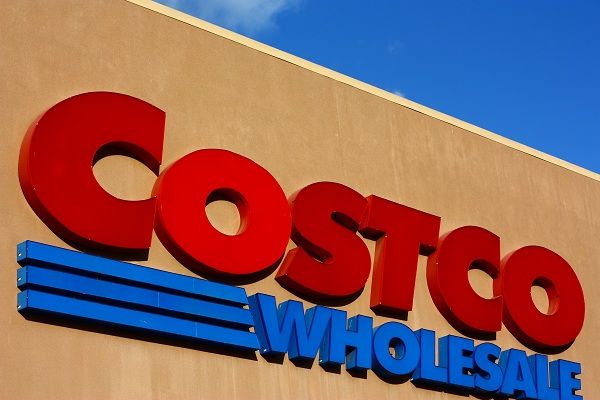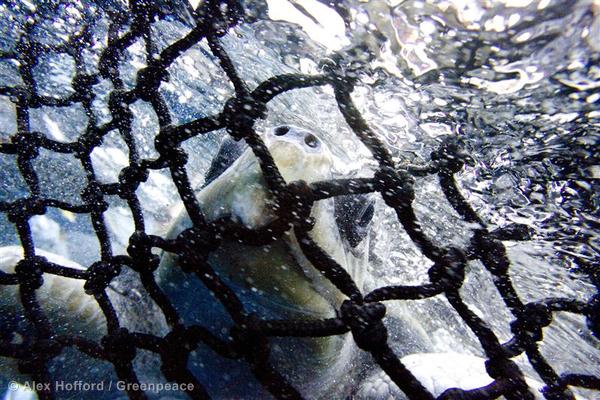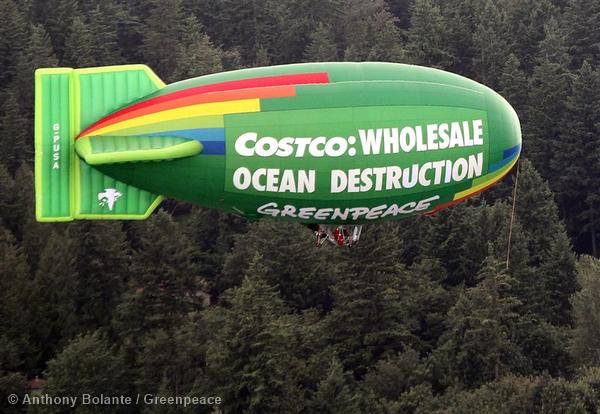When it comes to eating sustainably and inexpensively, you can have your cake and eat it too. Costco, the bulk-buying mecca, announced this week its Kirkland brand of skipjack tuna will not use the Fish Aggregating Devices that kill countless sharks, turtles, rays and other marine wildlife. Costco announced they were switching from Chicken of the Sea, their former skipjack tuna supplier.
The cherry on top?Costcos brand of skipjack tuna will beone of the most affordable cans of tuna available.
Why is Costco making the change? Because consumers want it.
Grocery shoppers areused to the big three when it comes to shopping for canned tuna in our grocery stores- Bumble Bee, Starkist and Chicken of the Sea. Unfortunately, all three of these companies rely on unnecessarily destructive practices. This recent move by Costco is yet another example that there is a better way and retailers are responding to consumers who want a responsibly sourced product.
Costco has only solved one part of their tuna problem, however. Bumble Bee continues to supply Costcos line of albacore tuna, which is caught using conventional longlines — a destructive fishing practice that kills far more than just tuna. We look forward to watching Costco build on this momentum and find a supplier willing to source a responsible albacore product.
What is sustainable tuna?
Tuna is the most consumed seafood in America after shrimp. Sadly, the overfishing of tuna and reckless practices by the fishing industry have brought several ocean species, in addition to tuna, to the brink of extinction.
Currently, most of the fishing industry uses destructive fishing practices that harm far more than just tuna populations. Fishing fleets use fish aggregating devices (FADs) with large purse seine nets to catch skipjack tuna, or chunk light tuna. This practice kills countless sharks, rays, turtles and even juvenile bigeye tuna – a species the International Union for Conservation of Nature considers to be at a high risk of extinction in the wild.
Additionally, tuna companies use longlines to catch albacore tuna, or solid white, tuna. 30 percent of the longline catch, however, is composed of seabirds, turtles, sharks and other species that are then thrown back dead.
READ more about the secrets in the tuna can
Canned tuna is an affordable source of protein upon which many families depend, but it doesnt have to come at the cost of the entire ocean.
Wal-Mart, Safeway and now Costco have offered their own line of FAD-free tuna supplied using more responsible fishing methods. Costco will now fish on free schools of tuna replacing the FAD method for its skipjack.
Is Costcos tuna 100 percent sustainable now?
Costco is on its way to offering 100 percent sustainable tuna, but its not there yet. The grocery retailers albacore tuna is still sourced from Bumble Bee which uses destructive longline practices. A catch from a longline often results in 30 percent non-tuna bycatch that is thrown back dead in the water.
Oh, and BumbleBee also sources fish from vessels that participate in the shark fin trade resulting in millions of dead sharks a year.
Costco should follow their skipjack tuna lead and apply it to their albacore product, and that of Safeway, by dropping Bumble Bee and offering their own line of responsibly-caught albacore tuna. Costco has already come a long way since their days selling wholesale oceans destruction which Greenpeaces airship message read when we flew over their Seattle headquarters in 2010.
Consumer power
Shoppers should all have access to affordable, healthy and sustainable food options. Costcos step towards 100 percent sustainable tuna is huge progress for the health of our oceans and its species. Retailers are responding to consumer demand for products like FAD-free tuna by ditching reckless companies like Bumble Bee and offering their own product more affordably.
Consumers are asking for sustainable tuna so retailers are stepping up and doing what America’s biggest tuna companies should have done years ago.
The more information consumers have at the grocery store, the better. Greenpeace annually releases our Carting Away the Oceans report which ranks grocery stores on their seafood policies including canned tuna and other seafood species.
Costco has made significant progress with their switch to responsibly-sourced skipjack tuna, getting closer to sustainable seafood leaders like Whole Foods and Safeway. Not only is this great news for our oceans, but its also great news for shoppers concerned with how their food is sourced.





